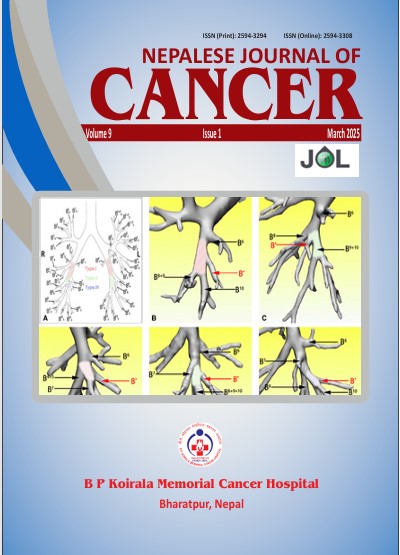Role of HALP score in predicting short term outcomes after surgery in esophago-gastric cancers
DOI:
https://doi.org/10.3126/njc.v9i1.77095Keywords:
Esophageal cancer, Esophagectomy, HALP scoreAbstract
Background: Esophago-gastric cancers are common cancers with poor prognosis. Radical surgery offers the best hope for long term survival but is associated with increased short-term morbidity and mortality. There is a need for a simple scoring system that helps in estimating the short-term prognosis of the patient after undergoing surgery for these cancers. Hemoglobin, Albumin, Lymphocytes, Platelets (HALP) score is such a scoring system that has recently been developed. The aim of this study was to evaluate the role of HALP score in predicting short term outcomes after surgery in esophago- gastric cancers.
Methods: We conducted a prospective study of all patients with esophago-gastric cancers undergoing curative intent surgery in the surgical oncology department. The optimal HALP cut-off point was evaluated using Receiver operating characteristics (ROC) analysis and the cohort was divided into Low and High HALP groups, which were then further analyzed.
Results: The mean age was 61.52 ± 9.07 years. Of these 17 (54.8%) were male and 14 (45.2%) were female. Squamous cell carcinoma was the more common histology. The optimal cut-off value of HALP was 38.0 with a sensitivity of 86.7% and specificity of 87.5%. Low HALP was significantly associated with Anastomotic leak, SSI, overall mortality and prolonged hospital stay.
Conclusion: HALP score can be a good prognostic indicator for patients with esophago-gastric cancers undergoing curative resection.
Downloads
Downloads
Published
How to Cite
Issue
Section
License
Copyright (c) 2025 Nepalese Journal of Cancer

This work is licensed under a Creative Commons Attribution 4.0 International License.
This license lets others distribute, remix, tweak, and build upon your work, even commercially, as long as NJC and the authors are acknowledged.
Submission of the manuscript means that the authors agree to assign exclusive copyright to NJC. The aim of NJC is to increase the visibility and ease of use of open access scientific and scholarly articles thereby promoting their increased usage and impact.




